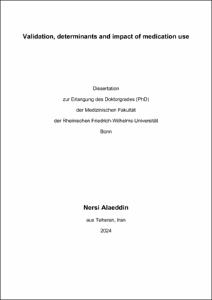Alaeddin, Nersi: Validation, determinants and impact of medication use. - Bonn, 2024. - Dissertation, Rheinische Friedrich-Wilhelms-Universität Bonn.
Online-Ausgabe in bonndoc: https://nbn-resolving.org/urn:nbn:de:hbz:5-75670
Online-Ausgabe in bonndoc: https://nbn-resolving.org/urn:nbn:de:hbz:5-75670
@phdthesis{handle:20.500.11811/11463,
urn: https://nbn-resolving.org/urn:nbn:de:hbz:5-75670,
author = {{Nersi Alaeddin}},
title = {Validation, determinants and impact of medication use},
school = {Rheinische Friedrich-Wilhelms-Universität Bonn},
year = 2024,
month = apr,
note = {In recent decades, global medication consumption has increased substantially due to an aging population and more emphasis on preventative treatment. As medication use increases, concerns naturally arise regarding the potential for unintended adverse effects and their broader implications for health. In response to these concerns, this thesis emphasizes the importance of population-based cohorts in pharmacoepidemiology.
Using data from the ongoing, community-based Rhineland Study, this thesis pursued three main objectives: (I) to validate the reliability of self-reported medication data in the Rhineland Study, (II) to explore the prevalence and putative determinants of over- and undertreatment with commonly used drugs, and (III) to examine associations between proton pump inhibitors (PPIs) and brain functioning.
Validation of self-reported medication use, confirmed through measured plasma drug metabolites, revealed high concordance rates independent of age and sex. This attests to the reliability of the collected medication data. Exploration of over- and undertreatment of commonly used drugs, namely levothyroxine (LT4) and antihypertensive drugs, identified a high proportion of individuals with inadequate treatment. Among LT4 users, comprising almost a quarter of the population, 4% were undertreated, and 18% were overtreated, particularly affecting the elderly. For antihypertensive drugs, 20% were overtreated, and 33% were undertreated, revealing notable sex differences, with women more likely to be overtreated than men. Risk factors such as age, body mass index, and chronic kidney disease influenced over- and undertreatment risks differently in women and men. Lastly, a focused investigation of PPI effects on brain function, utilizing a detailed cognitive battery and state-of-the-art MRI, revealed potential cognitive implications and disruptions in white matter integrity, particularly among younger long-term users.
The high prevalence of inadequate treatment emphasizes the need for cautious dosing and deintensification strategies, with a call for vigilance against overtreatment. Furthermore, this thesis challenges the assumed safety of PPIs, highlighting potential detrimental effects on brain functioning. Recognizing the risk of harm from seemingly safe drugs, prudent use and prescribing practices are crucial. Hence, population-based cohorts in pharmacoepidemiology play a vital role in unravelling patterns and refining treatment guidelines.},
url = {https://hdl.handle.net/20.500.11811/11463}
}
urn: https://nbn-resolving.org/urn:nbn:de:hbz:5-75670,
author = {{Nersi Alaeddin}},
title = {Validation, determinants and impact of medication use},
school = {Rheinische Friedrich-Wilhelms-Universität Bonn},
year = 2024,
month = apr,
note = {In recent decades, global medication consumption has increased substantially due to an aging population and more emphasis on preventative treatment. As medication use increases, concerns naturally arise regarding the potential for unintended adverse effects and their broader implications for health. In response to these concerns, this thesis emphasizes the importance of population-based cohorts in pharmacoepidemiology.
Using data from the ongoing, community-based Rhineland Study, this thesis pursued three main objectives: (I) to validate the reliability of self-reported medication data in the Rhineland Study, (II) to explore the prevalence and putative determinants of over- and undertreatment with commonly used drugs, and (III) to examine associations between proton pump inhibitors (PPIs) and brain functioning.
Validation of self-reported medication use, confirmed through measured plasma drug metabolites, revealed high concordance rates independent of age and sex. This attests to the reliability of the collected medication data. Exploration of over- and undertreatment of commonly used drugs, namely levothyroxine (LT4) and antihypertensive drugs, identified a high proportion of individuals with inadequate treatment. Among LT4 users, comprising almost a quarter of the population, 4% were undertreated, and 18% were overtreated, particularly affecting the elderly. For antihypertensive drugs, 20% were overtreated, and 33% were undertreated, revealing notable sex differences, with women more likely to be overtreated than men. Risk factors such as age, body mass index, and chronic kidney disease influenced over- and undertreatment risks differently in women and men. Lastly, a focused investigation of PPI effects on brain function, utilizing a detailed cognitive battery and state-of-the-art MRI, revealed potential cognitive implications and disruptions in white matter integrity, particularly among younger long-term users.
The high prevalence of inadequate treatment emphasizes the need for cautious dosing and deintensification strategies, with a call for vigilance against overtreatment. Furthermore, this thesis challenges the assumed safety of PPIs, highlighting potential detrimental effects on brain functioning. Recognizing the risk of harm from seemingly safe drugs, prudent use and prescribing practices are crucial. Hence, population-based cohorts in pharmacoepidemiology play a vital role in unravelling patterns and refining treatment guidelines.},
url = {https://hdl.handle.net/20.500.11811/11463}
}






